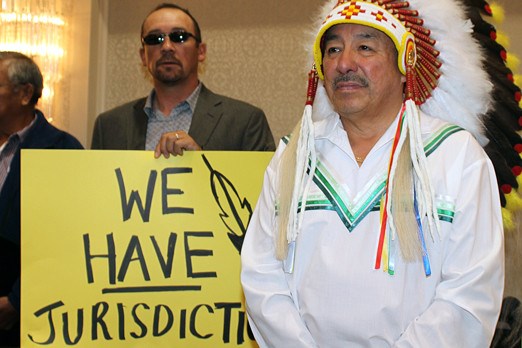Nishnawbe Aski Nation leaders have drawn a line in the Northern Ontario wilderness.
On Friday, after a two-day emergency chiefs assembly in Thunder Bay, they declared that unless the province gives them final say on development in all of their territory under its proposed Far North Act, trouble lies ahead.
NAN Grand Chief Stan Beardy, surrounded by sign-toting leaders with messages calling for the province to squash Bill 191, protect our future and declaring we have jurisdiction, was adamant that the government hear their call.
"Our declaration of opposition is unanimous. It is supported by all 49 community chiefs and all our councils," Beardy said. "If the bill is forced through, there will be conflict in the North. There will be no certainty for the government or the investors."
The act, also known as Bill 191, would arbitrarily set aside 50 per cent of the province’s north, about 225,000 square kilometers, as parkland, free of any development without the assent of Queen’s Park.
This is not acceptable, Beardy said.
"Bill 191 divides NAN territories with an artificial boundary. That division violates the spirit of Treaty 5 and 9," Beardy said. "Bill 191 freezes development in the far entire north."
It's no way to encourage self-sufficiency, says the leader of one of hardest hit First Nations in Ontario.
Sandy Lake First Nation chief Alvin Fiddler said his community, located 600 kilometres northwest of Thunder Bay, is immersed in poverty and the right to develop – or not develop – should be left up to the individual communities, allowing them to determine their own economic futures.
It’s up to the province to decide the next course of action, Fiddler said, adding NAN leaders plan to discuss possible reaction should the bill go through as written.
If not, there are plenty of options for them to force the issue, he said.
"There have been discussions of roadblocks, taking our message to Queen’s Park, taking a look at industry that’s in our territory now and asking everybody to leave – first of all asking them nicely. And if that doesn’t happen, then taking more direct action," Fiddler said.
A day after meeting with Natural Resources Minister Linda Jeffrey, Fiddler was hopeful it doesn’t come to that, though he said nothing he and other aboriginal leaders have heard to date suggests the province is willing to bend.
Fiddler added that nowhere in the century-old Treaty 5 did his people surrender jurisdiction over their lands and the activities that take place there.
"Our people will hold the leadership (of Ontario) accountable to that. And if the province continues the way it is now, they’re heading for a conflict," he said, comparing it potentially to the recent conflict at Kitchenuhmaykoosib Inninugwug First Nation that saw six community leaders sent to prison after refusing to allow junior mining company Platinex to explore their traditional lands.
"That’s just the tip of the iceberg. They’re creating a scenario where there will be more problems with First Nations and industry and anybody that wants to be involved with working together with First Nations. This bill, the way that it’s laid out, creates problems. That’s not where we want to go, but if that’s where the province chooses to go, that’s the direction that we’ll take."
Friday’s reaction to the Far North Act is a far cry from the tale spun by Jeffrey the day before.
Jeffrey stated she’s very hopeful about the progress of the Far North Act, said Thursday’s meetings with the chiefs was amicable and that she was open to tweaking the wording of the legislation.
"I’m cautiously optimistic that we’re going to find some solutions over the next few weeks before we get to clause-by-clause (examination). Certainly I’ve heard from First Nations chiefs that they understand that development is important and they’re not against it and they see this bill as the way to ensure that economic development comes to the far north," she said.
That’s not how Arlene Slipperjack, chief of Whitewater First Nation, sees the situation, saying past history shows the province can’t be trusted to make decisions in the best interests of her people.
"Our people are very poor. We have no jobs, we have no homes … and we have endured 16 years of broken promises by the province," said Slipperjack, adding their lands are already tied to the provincial park system, leaving them little room for economic growth because of strict development regulations.
Slipperjack said if the province moves forward with the Far North Act, she wants Ontario to compensate the people of Nishnawbe Aski Nation for denying them a chance to profit from their traditional territory.
"There is no future for our future generations, none at all. We have no land to call our own," she said. "We are homeless in our homeland."
NAN communities are the not the only opponents of the Far North Act. On Thursday Ontario Conservative Leader Tim Hudak promised he would repeal it should it pass and his party take the next election. Also speaking out against it were the Thunder Bay Chamber of Commerce and the Ontario Prospector’s Association.
